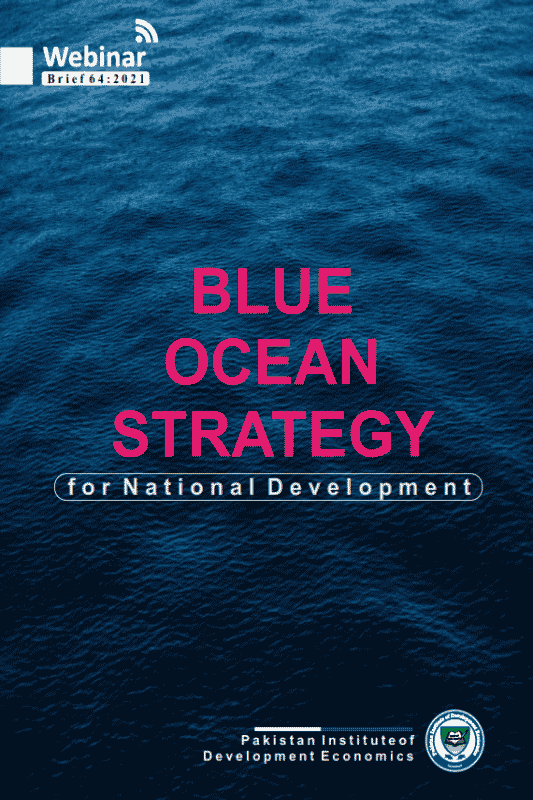Blue Ocean Strategy for National Development
Publication Year : 2021
Author: Nafiza Riaz
Explore More : Webinars Brief
Blue Ocean Strategy for National Development
Preamble
The purpose of this webinar is to introduce the best practices in the corporate and development sector which the guest speaker learned from the world abroad. The company DAMSON led by Mr. Syed Faraz Mujtaba gathers knowledge and best practices from all around the world.Key Messages
- The basic idea of the blue ocean strategy is how to create uncontested market space and make the competition irrelevant. The strategy is equally applicable in business as well as public development context. Competition is a force that consumes all money, energy, time, and capability in any type of business. It is an unnecessary and resource-exhausting menace. So the concept of the blue ocean which refers to an uncontested market emerged. The book “Blue ocean strategy” is a best seller book among the business community and millions of copies of this book are sold around the world with translation done in 16 languages of the world. This book was published in 2005. It remains the best seller book on management till 2019.
- The hallmark of the blue ocean strategy is that it makes a difference. It is a cost-saving and buyer valuing strategy. It saves cost by eliminating and reducing the factors an industry competes on. Buyer value is lifted by raising and creating elements that the industry has never offered.
- The conventional red ocean market and emerging blue ocean strategy differ in many ways. In the red ocean, market businesses compete, beat the competition, exploit existing demand, make a value-cost trade-off and align firm’s activities with differentiation and low cost. Blue ocean strategy, on the other hand, creates uncontested market space, makes competition irrelevant, creates and captures new demand, breaks the value-cost trade-off, and aligns the firm’s activities in pursuit of differentiation and low cost.
- The profit of many companies increased by adopting the blue ocean strategy. Companies like Google, Red Bull, Netflix, WhatsApp, Starbucks, Bloomberg business, Facebook, Apple, Gillette, YouTube, Wikipedia, and many others earned an incremental profit of billions of dollars. Microsoft, Apple, and reached a net 1 trillion dollars of market value. One thing that has come to these companies is they believe and adopt the policy of non-competition.
- Blue ocean strategy remained a successful strategy even during this unusual period of the covid pandemic. 100 out of 70 best performing companies during covid are following the blue ocean strategy. Forbes published an article “there will be blue ocean strategy everywhere after the pandemic is over. Apple reached a net worth of 2 trillion dollars in 2021, doubling its profit because of pursuing this strategy. Apple is earning 6.8 billion dollars per day since March 2020. Pakistan went to the IMF program to get 6 billion dollars over five years. If we have a single established company with a blue ocean strategy, it would be sufficient to prevent the IMF. It is a very promising strategy for any organization or nation.
- The strategy is based on out-of-the-box solutions which cannot be copied by other companies. That is a crazy one-shot strategy. Successful blue ocean strategies exploit the emotions, utilize them to increase the functionality of society.
- This strategy proved to be equally successful in politics, nonprofit organizations like comic relief introduced “red nose day” which raised 1 billion pounds in one day. In space, SpaceX came up with a seemingly nonsense idea to fly just using this out of boundary strategy. All these businesses flourished by a mere change of strategy. When any business flourishes it ultimately boosts up the economy of the country.
- In the perspective of national development, traditionally we look to economists to devise effective policies, but in the present world with the help of the blue ocean strategy, it is the people who are strategists, not an economist who can explore new areas to grow. If economists become strategists this will alter the course of the nation. The living examples in this domain include Thailand which is the leader of medical tourism in ASEAN countries.
- Similarly, Malaysia adopts a social transformation program “National Blue Ocean Strategy”. The purpose was to create and boost the uncontested market in Malaysia in almost all sectors of the economy. Implementing this strategy resulted in the emergence of Malaysia as 5thlargest growing economy in the world in 2014-15.
© 2024 Pakistan Institute of Development Economics




